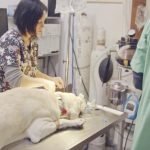What is a non-traditional diet? It’s defined as anything outside of the normal kibble or canned food and it has become an increasingly popular diet alternative among pet owners. Dr. Smolkin outlines the importance of a balanced diet and the consequences that it can have if it does not meet the nutritional needs of your pet. If you are interested in having your pet follow a non-traditional diet, Dr. Smolkin offers advice on what to look for when choosing recipes as well as dehydrated and pre-formulated food. She also gives her take on raw food diet’s and provides tips on how to ensure that your pet’s food is prepared as safely as possible.
TRANSCRIPT:
Hi, I’m Dr. Ilana Smolkin here for healthcarepets.com. I’m going to talk a little bit about non-traditional diets. So I consider a non-traditional diet anything outside of the normal sort of kibble or canned food that you’d get through a pet store or through a veterinarian clinic. This would include home-cooked diets, raw diets, dehydrated little patties you can buy or anything of that sort.
One thing that needs to be looked really carefully at this type of diet is the balancing of that diet. Dogs have different nutritional needs than we do, their calcium phosphorus ratios, their mineral needs are different and so it’s really important that that diet meets those needs for that pet so that we don’t end up with other healthcare issues. Most people who choose non-traditional diets are doing so because they really want to do what’s best for their pet so it’s important that it’s done well.
If they’re off balance we can see all sorts of problems from bone weakness so fractures, teeth issues, things like bladder stones and again none of these are issues that any of us want to deal with.
So the first thing I look at if someone comes into my practice and says they’re feeding a non-traditional diet, especially of a home-cooked variety or raw but home prepared I’ll ask where the recipe came from. Did they just come up with it on their own or what source did they get it from? I’d like to see that that diet or that recipe came from someone with a nutritional background or veterinary nutrition background.
The next questions I ask is whether someone subbed out one ingredient for another. This seems really innocent you know I’m just going to use carrots instead of potatoes but that can make a huge difference to that balancing of that diet, totally different nutrients in a carrot versus a potato, for example.
There’s lots of great resources available for people who want to use these type of diets. There are books available often through your veterinarian that also are paired with a mineral mix that give you lots of different options of diets that you can try. There are also some websites that will help you formulate a diet. Now be careful in choosing that website, look at the credentials of the person that’s offering it because you want to again make sure that it’s a veterinarian or someone with a PhD in animal nutrition, someone who’s got that training. I would also like to see on that website that they say something along the lines that if your pet has more advanced nutritional needs or healthcare issues that then they want to work both with you and your veterinarian to make sure that that diet that’s formulated meets all those needs.
For people who don’t want to cook there’s frozen patties and things like that that you can get. It’s important if you’re going to choose this type of diet that you do some research into how the diet was again formulated. Was the recipe checked for balancing and do they do testing along the way to make sure that the diet is accurate. Also did they do any testing to make sure that there’s no contamination so no bacteria or any problems like that in the final product.
There are also some companies that offer dehydrated foods where all you got to do is add water but again back to my previous point is do some research as to how those diet formulations came about.
Raw food, now this is a very hot button topic and it’s discussed in another video here but I’ll give you my take on it. There are lots of studies out there that show that there is increased bacteria in those raw food diets and then those bacteria are shed by your pet however I have seen some pets do very well in this type of diet but there are things to keep in mind.
If you’re using a raw diet, one piece of advice is that you can sear the outside of the meat and that’s going to decrease the bacterial load. If you’re using a raw diet that’s completely pre-prepared for you, some of these companies actually even do their own pathogen testing and can look into making sure that there’s no bacteria in their final product and will guarantee that. They also will do some balancing testing on that as well and I think that’s an important thing for you to look into.
Care should be taken in using a raw diet if you’ve got an immunocompromised pet so an animal undergoing chemotherapy or an animal that’s debilitated with a bad disease so cancer or an older pet, care should be taken in those circumstances.
Ultimately what’s important to know is there’s not one good diet for all patients. Every pet is totally unique and has different nutritional needs and it’s not always obvious which diet we should choose, sometimes it takes trying a few to find that right diet. I hear things all the time like, “It’s normal but my cat throws up” or “You know my dog’s stools are always soft so I’m not worried” but ultimately even though those things are common they’re not normal. So to me if your pet’s digestion is not optimal then we need to be open to changing that diet to something different whatever that might be whether it’s traditional or non-traditional, finding some way to make sure that we’ve got good stool output and I love to ask about poop and how it looks like even though most people don’t really like discussing that and making sure that your pets not throwing up because again although a cat vomiting is common, it’s not normal.
What’s most important is that you should review your pet’s nutritional needs with your veterinarian because what’s important to us is your pet’s health here at healthcareforpets.com.








